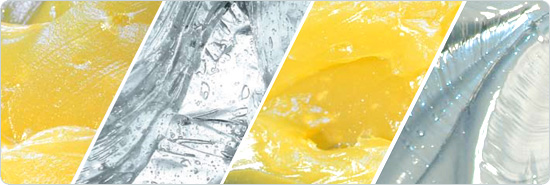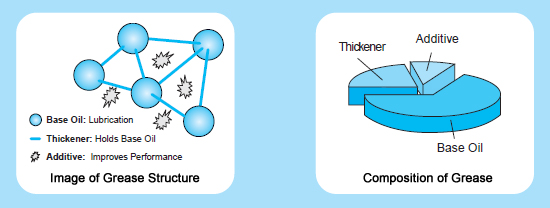- Main Clients and markets
- Customer Service
- Bearing Selection services
- Bearing Handling Service
- Bearing Fitting Service
- Lubrication Service
- Preload
-
Bearing cleanliness

Lubricating grease consists of a mineral or synthetic oil combined with a thickener. The thickeners are usually metallic soaps. However, other thickeners, e.g. polyurea can be used for superior performance in certain areas, i.e. high temperature applications. Additives can also be included to enhance certain properties of the grease. The consistency of the grease depends largely on the type and concentration of the thickener used and on the operating temperature of the application. When selecting a grease, the consistency, operating temperature range, viscosity of the base oil, rust inhibiting properties and the load carrying ability are the most important factors to be considered. Detailed information of these properties is as follows.

● Base oil
Base oil refers to the liquid lubricant carried by a thickener. Mineral oils are widely used as the base oils for grease. Synthetic oils such as diester or silicone oil are also used for improving the heat resistance and stability of grease. In general, grease with low-viscosity base oil is suitable for low temperatures or low loads, while grease with high-viscosity base oil is suitable for high temperature and, or high loads. Grease using high-viscosity base oil has superior hightemperature and high-load characteristics.
● Thickening agents
Thickening agents are compounded with base oils to maintain the semi-solid state of the grease. Thickening agents consist of two types of bases, metallic soaps and non-soaps. Metallic soap thickeners include: lithium, sodium, calcium, etc. Non-soap base thickeners are divided into two groups: inorganic (silica gel, bentonite, etc.) and organic (polyurea, fluorocarbon, etc.). The various special characteristics of a grease, such as limiting temperature range, mechanical stability, water resistance, etc., depending largely on the type of thickening agent used. For example, sodium-based grease is generally poor in water resistance properties, while greases with bentone, polyurea and other non-metallic soaps as the thickening agent are generally superior in high temperature properties.
● Additives
Refer to an agent that provides extreme pressure and rust resistance. Grease often contains a variety of additives such as anti-oxidants, rust preventatives, and extreme pressure enhancers to give it special properties. Various additives are added to grease to improve various properties and efficiency. For example, there are anti-oxidants, high-pressure additives (EP additives), rust preventives and anti-corrosives. For bearings subject to heavy loads and shock loads, grease containing high-pressure additives should be used. For comparatively high operating temperatures or in applications where the grease cannot be replenished for long periods, grease with an oxidation stabilizer is best to use.
● Oil seperation
All grease has a tendency to “bleed”. This means the seperation of the base oil from the thickener. The amount of oil seperation varies with the type of grease, its oil viscosity and thickener characteristics. If there is an extended standstill period during operation, oil seperatioin can occur if the wrong grease was selected.
● Salt Spray Test Report
| Test Date: October 27, 2012 Test No.: 1210003 | ||
|
Test Duration: from 3:00pm on 27th to 3:00pm on 28thTotal:24 hours Spray time: 24 hours |
||
| 1. Sodium chloride quality | Analytically pure (pecial for Salt spray test ) | |
| 2. Distilled water quality | Pure drinking water | |
| 3. Spray device: | 1.6 ml /80cm/h | |
| 3.1 spray volume | 1.5 | |
|
3.2 Collect the concentration or proportion of solution under room temp. |
1.0339(5% sodium chloride) | |
| 3.3 PH | 6.9 | |
| 4.Sample test: |
cover the bearing surface with FUCHS anti-rust oil No.230L (coating compactness and rust-preventing characteristic of FUCHS No.230L anti-rust oil) |
|
| 4.1 Type | High carbon chromium bearing steel | |
| 4.2 Shape | 6204 ZZ&6205 ZZ | |
| 4.3 scale | ||
| 4.4 number | 10pcs | |
| 5. The compressed air pressure | 1.00Kgf/cm | |
| 6. Laboratory relative humidity | 86% | |
| 7. Laboratory temperature | 35℃ | |
| 8. Pressure barrel temperature | 47℃ | |
| 9. Salt water barrel temperature | 35℃ | |
| 10. Others(room temperature) | 22℃ | |
| Judgment: Qualified |
1. Make judgment in accordance with the standard drawing : no peeling of, no blistering, no rust or any other phenomenon |
|
| According to GB/72423.17-93 | 2. In accordance with the other methods : Qualified | |
| Operator: Rong Guoxiang | Audit:Chen Yinjun | |
Attached images

|

|

|

|
|
The appearance of the salt spray chamber |
Testing process |
Bearing appearance after testing |
Bearing appearance after testing |




